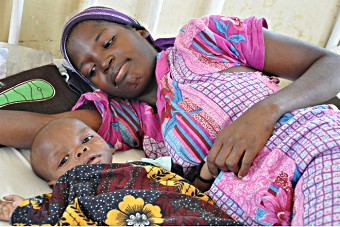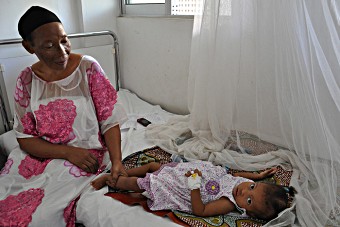Rotavirus vaccines: a compelling case for their use in Africa and the world
 Last month, I visited the pediatric ward of a district hospital in Dar es Salaam, Tanzania, and found it relatively empty. Relative, that is, to what I would expect to find in the rainy season, when three to four children typically fill each bed. Children hospitalized during the rainy season mainly suffer from respiratory disease or severe diarrhea. Of the children with severe diarrhea in that ward in Dar es Salaam, as throughout hospitals in Africa, the majority will be infected with rotavirus.
Last month, I visited the pediatric ward of a district hospital in Dar es Salaam, Tanzania, and found it relatively empty. Relative, that is, to what I would expect to find in the rainy season, when three to four children typically fill each bed. Children hospitalized during the rainy season mainly suffer from respiratory disease or severe diarrhea. Of the children with severe diarrhea in that ward in Dar es Salaam, as throughout hospitals in Africa, the majority will be infected with rotavirus.
Rotavirus is the leading cause of severe diarrhea in children under five years of age, killing as many as half a million each year. A staggering 50 percent of these deaths occur in Africa; six of the seven countries with the highest child death rates from rotavirus are located on the continent.
While these statistics are disturbing, there is hope. Rotavirus vaccines are already saving children’s lives today in countries where children have access to them—and could be saving millions more in Africa and around the world if they were more widely used.
Three recent scientific studies strengthen the case that rotavirus vaccines reduce the risk of disease, decrease deaths and hospitalizations, and save health care costs. Prior to the introduction of the vaccines in Mexico in 2006, 50 percent of deaths due to childhood diarrhea were caused by rotavirus. The country has since seen an impressive 56-percent reduction in the number of children under age five dying from diarrhea.
 In the US, a study by the Centers for Disease Control and Prevention (CDC) found that vaccinating infants against rotavirus led to a significant reduction in the number of older children hospitalized with severe diarrhea. The authors conclude that very young children transmit much of the rotavirus disease in communities and, by vaccinating them, severe forms of the disease can be prevented even in those who have not been vaccinated. Another CDC study reported dramatic decreases in health care visits and costs for diarrhea-related illnesses in children under age five following the introduction of rotavirus vaccines.
In the US, a study by the Centers for Disease Control and Prevention (CDC) found that vaccinating infants against rotavirus led to a significant reduction in the number of older children hospitalized with severe diarrhea. The authors conclude that very young children transmit much of the rotavirus disease in communities and, by vaccinating them, severe forms of the disease can be prevented even in those who have not been vaccinated. Another CDC study reported dramatic decreases in health care visits and costs for diarrhea-related illnesses in children under age five following the introduction of rotavirus vaccines.
The evidence supporting the use of rotavirus vaccines around the world is compelling, and African countries are beginning to demand this lifesaving tool. In July of this year, Sudan became the first country in Africa to introduce rotavirus vaccines nationwide with the support of the GAVI Alliance. This is the first step in a coming wave of introductions sweeping across Africa. By rapidly introducing rotavirus vaccines across the continent, we look forward to the day when pediatric wards in places such as Tanzania are nearly empty of children with severe diarrhea throughout the year.
Dr. Wecker directs PATH’s activities in vaccine access and delivery, which focus on developing and advancing strategies, technologies, and interventions that help move research achievements in immunization into routine use in the field.
This blog post is also featured on the Bill & Melinda Gates Foundation website.

